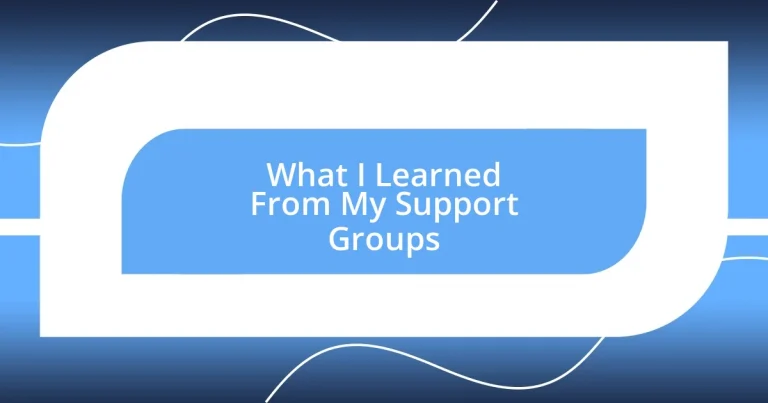Key takeaways:
- Support groups foster connection and understanding, transforming feelings of isolation into shared experiences, which can lead to personal growth.
- Finding the right support group is crucial; tailored groups can make individuals feel understood and validated, enhancing the overall experience.
- Active listening and vulnerability are essential for effective communication within support groups, promoting trust and deeper relationships while encouraging personal accountability and reflection.
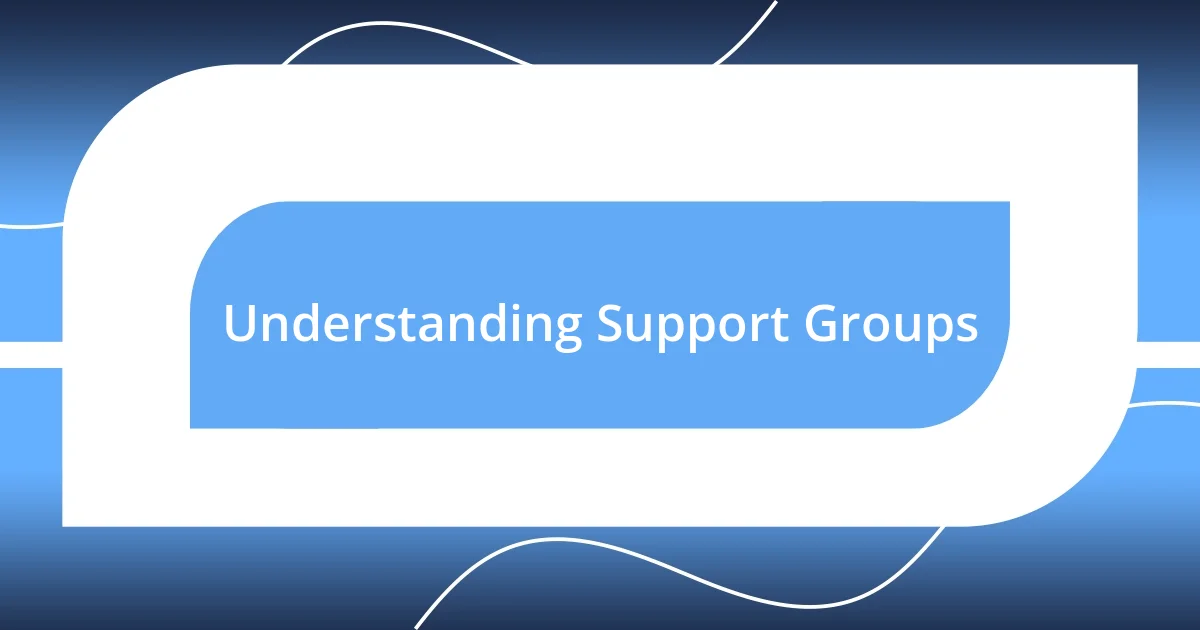
Understanding Support Groups
Support groups serve as a safe haven for individuals navigating similar challenges, fostering a sense of belonging and understanding. I vividly remember my first meeting; as I walked through the door, a mix of anxiety and hope surged within me. Would they understand my struggles? It turned out that sharing my thoughts with others who faced similar battles was incredibly liberating—it helped me realize I wasn’t alone.
These groups often create a unique environment where vulnerability is not only accepted but embraced. I recall a moment when a fellow member shared her deepest fears, and I felt an overwhelming sense of empathy wash over me. In that instant, I understood that support groups thrive on mutual trust, allowing us to express our emotions freely and learn from one another’s experiences.
Ultimately, the power of support groups lies in their ability to transform isolation into connection. I often left those meetings feeling uplifted, as if a weight had been lifted off my shoulders. Isn’t it fascinating how simply being surrounded by people who share your journey can ignite hope and spur personal growth?
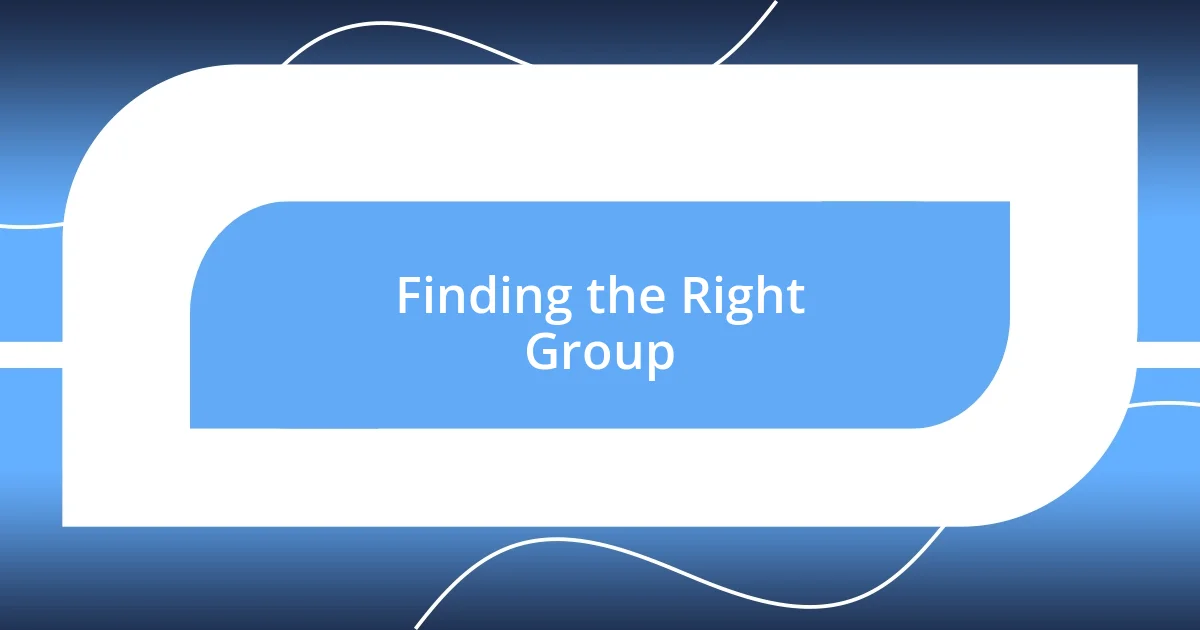
Finding the Right Group
Finding the right support group can feel daunting, but I’ve learned that it’s often a matter of aligning your needs with what a group truly offers. In my experience, I once attended a group focused on general anxiety. While I appreciated the diversity of experiences, I quickly realized that discussing broader issues made it hard for me to connect deeply. I was searching for something more specific, and it took some trial and error to find a group that resonated with my unique journey.
A pivotal moment arose when I discovered a support group specifically tailored for parents of children with special needs. The first time I entered that room, it felt like all the misunderstandings of the outside world melted away. Suddenly, I was surrounded by others who truly “got it.” The camaraderie and shared laughter over struggles made the journey feel less heavy. It was a transformative experience that taught me the importance of focusing on groups that cater to your specific circumstances.
Additionally, exploring different group formats has been enlightening. I’ve attended both in-person and online gatherings, and while I initially thought I’d prefer the face-to-face interaction, I found value in the convenience and comfort of virtual meetings. Connecting with others on video gave me the chance to engage in deeper conversations from the safety of my living room. It’s essential to evaluate these options to discover what feels right for you, ensuring that every meeting contributes positively to your journey.
| Group Type | Benefits |
|---|---|
| In-Person Support | Facilitates personal connection and immediate empathy. |
| Online Support | Provides flexibility and comfort in familiar surroundings. |
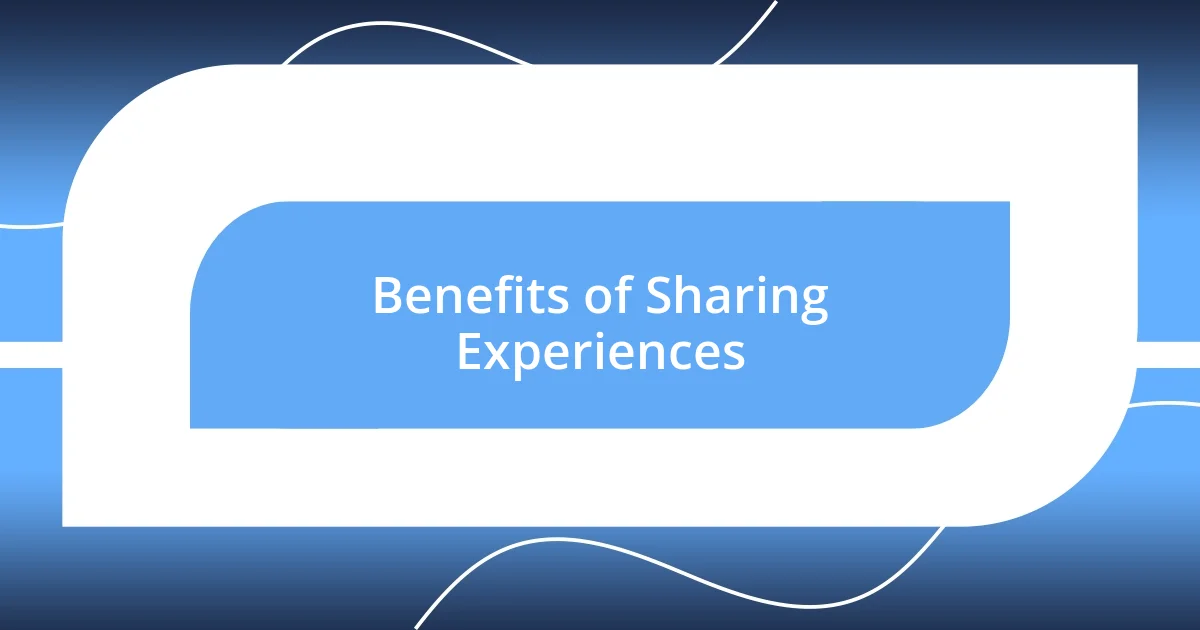
Benefits of Sharing Experiences
Sharing experiences in support groups brings about a transformative power that can’t be overstated. Personally, I was floored by how opening up about my own challenges created a ripple effect. When I shared my story, I noticed others nodding in agreement, and it struck me that our vulnerabilities created a bridge. This shared connection fostered an environment where we could be authentic, leading to mutual healing.
The benefits of sharing experiences include:
- Validation: It reassures us that our feelings are normal and that others face similar battles.
- Learning Opportunities: Hearing how others cope can spark new ideas and strategies for tackling personal challenges.
- Emotional Relief: Vocalizing our struggles lightens the emotional burden, creating space for hope and healing.
- Strengthened Bonds: Building relationships with others who get it leads to lasting friendships that extend beyond meetings.
I find it fascinating how these shared moments can not only boost morale but help us feel understood, fostering a collective journey towards healing. It’s in these authentic exchanges that I’ve discovered parts of myself I didn’t know existed.
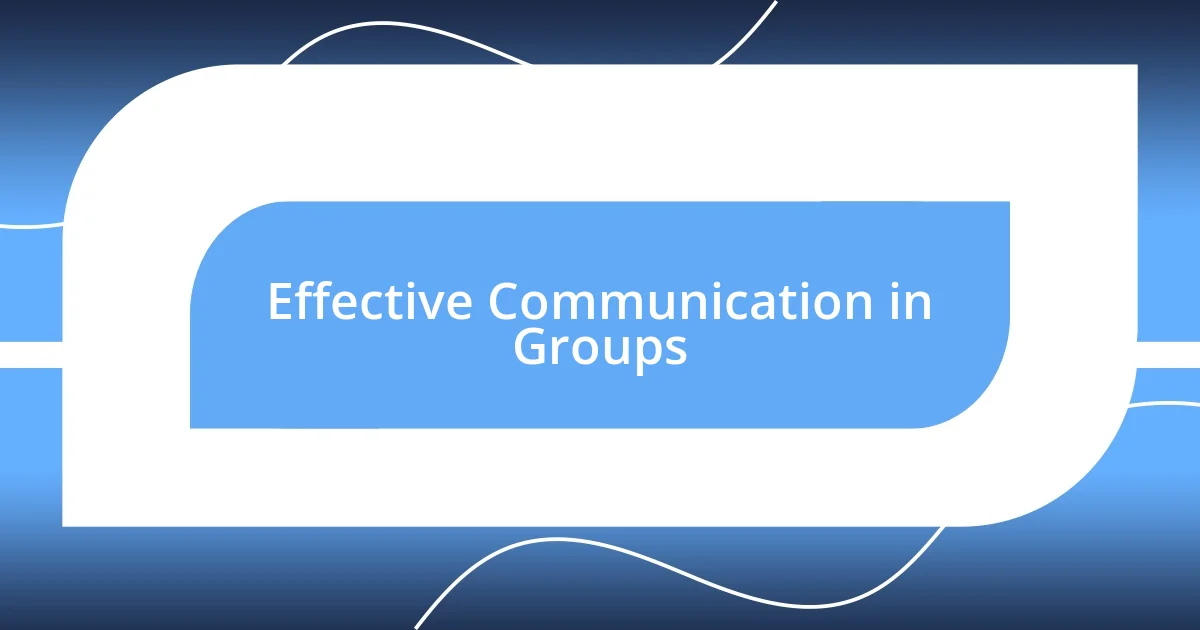
Effective Communication in Groups
Effective communication in groups is vital for creating a safe space where everyone feels heard. I remember the first time I attempted to share my feelings about parenting challenges; it was nerve-wracking. But when I finally opened up, the room filled with nods of understanding, which made me realize how powerful it is to communicate openly. Isn’t it amazing how vulnerable moments can unite us?
Listening actively is just as important. In one session, I noticed someone struggling to articulate their thoughts. When I offered my support and encouragement, it encouraged them to find their voice. It reminded me that sometimes, the best thing we can do is create an atmosphere where others feel comfortable enough to share. Have you ever experienced that feeling of relief when someone takes the time to really listen? It can be transformative.
In addition to sharing, I’ve learned that non-verbal communication plays a significant role in how messages are received. During meetings, I often pay attention to body language and facial expressions. I recall one occasion when I was discussing my struggles; the group’s empathetic silence spoke volumes. It reinforced the idea that effective communication transcends words and can foster a deeper connection through our shared humanity.
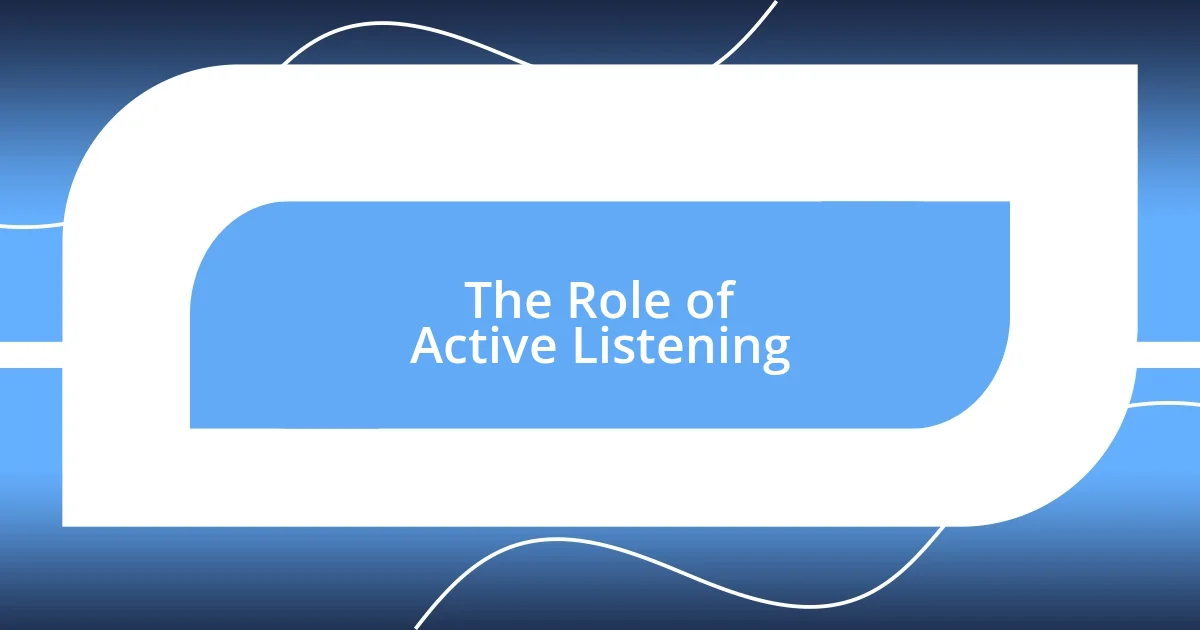
The Role of Active Listening
Active listening plays a pivotal role in support groups, and it’s something I deeply value. I remember a time when I was sharing a particularly tough chapter of my life, and the way the group listened—leaning forward, maintaining eye contact—felt incredibly validating. Isn’t it incredible how simply being heard can bring relief and encourage us to dig deeper into our feelings?
There’s more to active listening than just hearing words; it’s about understanding the emotions behind them. In one session, I witnessed a member struggling with their story. By giving them my full attention, nodding along, and avoiding interruptions, I could feel the weight lift off their shoulders. It was an emotion-filled moment that reminded me that often, people don’t just need our advice; they need to feel acknowledged and understood.
Reflecting on these experiences, I realize how essential active listening is to building trust within a group. I can’t help but ask: how often do we practice this in our everyday lives? Just the other day, I found myself in a conversation where I consciously put down my phone, looked someone in the eye, and truly listened. That connection was powerful. Active listening not only nurtures deeper relationships but also amplifies our own growth through shared experiences.
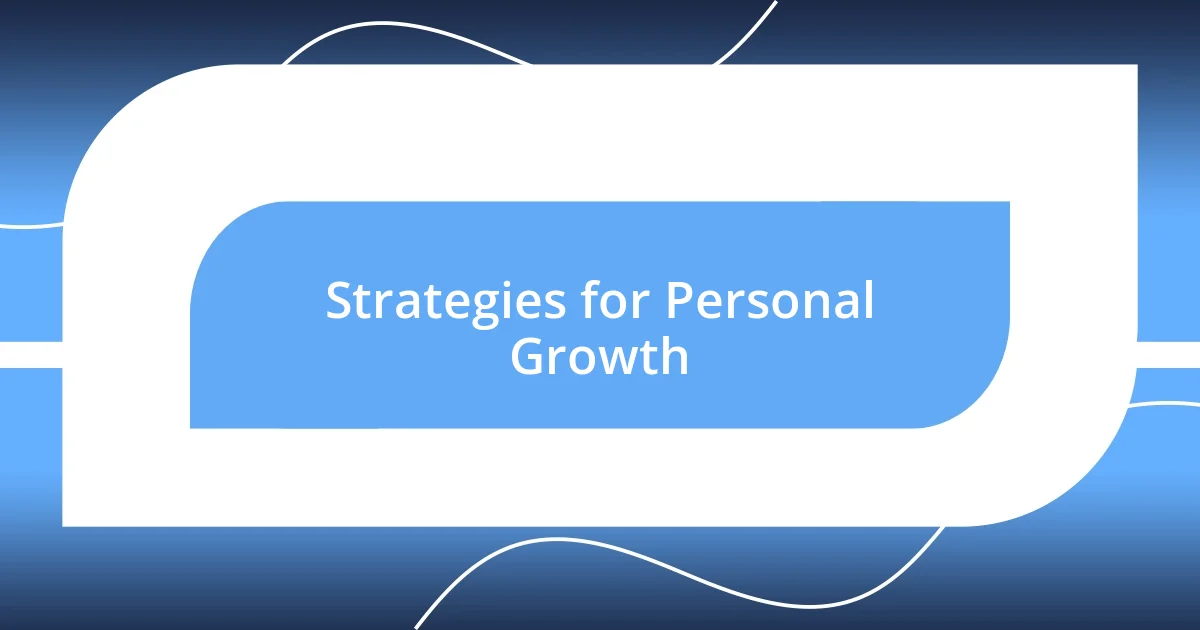
Strategies for Personal Growth
One strategy that has significantly contributed to my personal growth is embracing vulnerability. I distinctly recall a moment when I hesitated to share my deepest insecurities during a group session. As I slowly let my guard down, I could see other members lean in with empathy, and it struck me. Isn’t it intriguing how exposing our flaws can lead to not just personal healing but also deepen our bonds with others? Vulnerability creates a ripple effect, encouraging others to reflect on their own challenges.
Another effective method I’ve discovered is setting achievable, personal goals. During one session, I shared my desire to improve my self-esteem. The group offered suggestions that resonated, but what stood out was when one member encouraged me to start small—like writing down one positive thing about myself each day. Little by little, I noticed a shift, feeling more confident and empowered. Have you ever realized how breaking down big aspirations into bite-sized pieces can transform your approach to growth?
Lastly, the power of accountability can’t be overlooked. After committing to a personal goal during a session, I found that having a few members check in on my progress kept me motivated. One time, when I didn’t follow through, I felt the weight of my commitment—and it was a much-needed wake-up call. It makes me wonder: how often do we let ourselves slide when we don’t have someone to report to? I’ve come to value how support groups can serve as a nurturing framework to hold ourselves responsible while striving for growth.
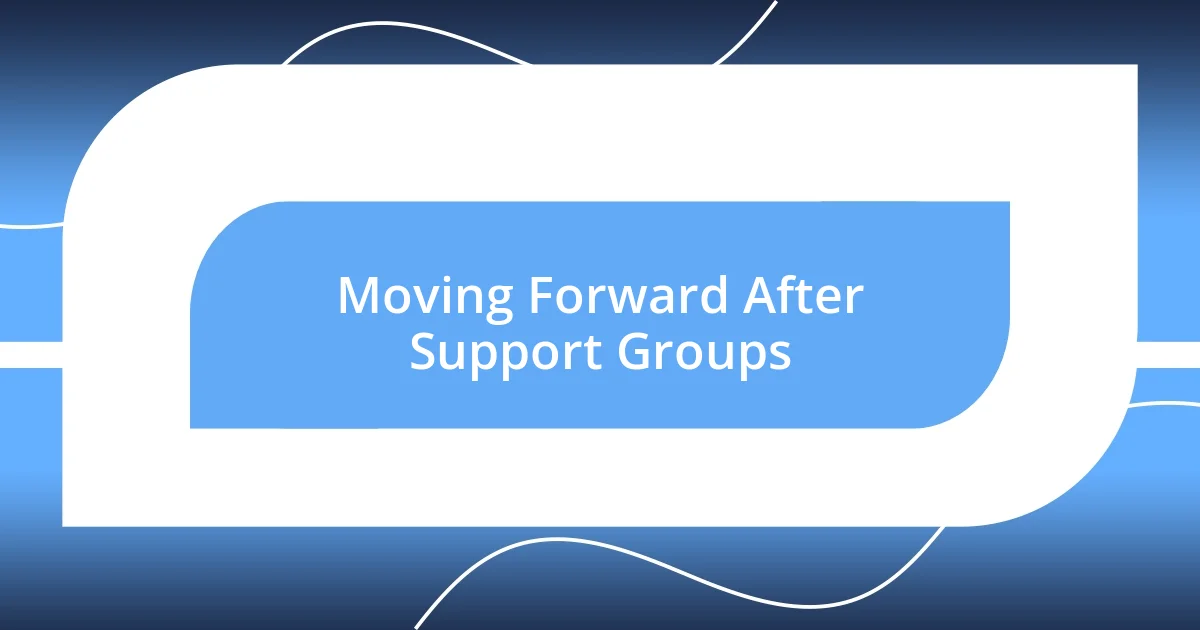
Moving Forward After Support Groups
Moving forward after support groups can feel both daunting and liberating. I remember leaving my last session, filled with a mix of hope and uncertainty. It struck me how armed I was with new insights yet faced the challenge of applying them in my everyday life. Isn’t it fascinating how the real work begins when you step out of that comforting circle of support?
One of the most impactful takeaways for me was the importance of self-reflection. After each group, I found myself journaling about what resonated with me. I recall a particular entry where I wrote about my fears and the group’s encouragement to confront them. Those moments of reflection not only helped clarify my thoughts but also motivated me to tackle the changes I needed to make. Have you ever tried putting your feelings into words? It can turn a swirling storm of emotions into a clear path forward.
Connecting those insights to real-life action is essential, and sometimes, accountability from fellow group members can be a game changer. I made a commitment to one member to share my progress weekly on a small personal project. Though some days were challenging, knowing I had someone checking in on me filled me with determination. It’s empowering to realize that moving forward does not have to be a solitary journey; sometimes, it’s about leaning on the connections we’ve made along the way.












